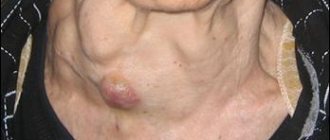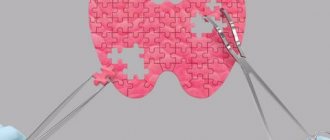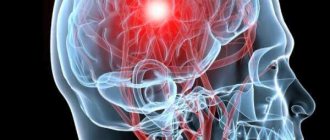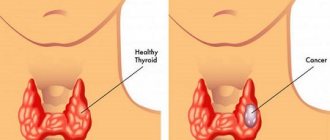Hypothyroidism is most dangerous for infants. If hyperthyroidism is not treated in a timely manner, children will suffer numerous and irreversible complications, especially with congenital hyperthyroidism of the thyroid gland. If hyperthyroidism of the thyroid gland is not cured in a child before the age of two, even with subsequent good treatment it is impossible to prevent his mental retardation. Statistics say that 1-2 out of 5000 newborns suffer from congenital hypothyroidism, with girls being twice as likely as boys.
Thyroid hyperthyroidism is not an independent disease, but a complex of symptoms that occurs with a number of autoimmune diseases and conditions of the thyroid gland:
- diffuse toxic goiter (Graves' disease, Basedow's disease, Perry's disease, Flayani's disease);
- nodular toxic goiter (Plummer's disease);
- toxic thyroid adenoma;
- initial stage of subacute thyroiditis;
- asymptomatic (painless) thyroiditis;
- some forms of autoimmune thyroiditis;
- artificial thyrotoxicosis (overdose of thyroid hormones);
- tumors of other organs (very rare).
With hyperthyroidism, all processes in the human body occur with increased intensity, the body works “for wear and tear”, in contrast to hypothyroidism, in which all processes slow down.
Today, more than a third of earthlings suffer from thyroid dysfunction. This butterfly-shaped gland is located in the middle third of the neck between the Adam's apple and the beginning of the sternum. The thyroid gland is the “queen” of all endocrine glands, the main supplier of hormones that affect absolutely all processes in the human body: weight, mood, performance, physical and mental well-being, and others. For example, no one has yet been able to reduce or increase their weight at will with an unhealthy thyroid gland. Despite the dominant role of this gland, people very irresponsibly forget about it, and symptoms indicating problems specifically in the thyroid gland are attributed to overwork, heredity - to anything, thereby wasting precious time and complicating the outcome of the disease.
What is hyperthyroidism
The thyroid gland is responsible for producing thyroid hormones. Hyperthyroidism is a pathological condition that is accompanied by an increase in the production of thyroxine (T4) and triiodothyronine (T3). This condition causes a kind of “fire in the body” when metabolic processes are significantly accelerated. The opposite of hypothyroidism, in which metabolism is slow. Hyperthyroidism triggers the following processes in the female body:
- An increase in thyroid hormones leads to an increase in oxygen consumption, which provokes an increase in heat and energy production.
- There is also an increase in the process of converting male sex hormones into female ones (estrogen dominance).
- cortisol rises rapidly, causing reversible adrenal fatigue syndrome.
There is an increase in the activity of the sympathetic nervous system, blood pressure increases, up to the development of hypertension. The hormonal activity of the thyroid gland increases, which provokes a worsening of the clinical picture of menopause.
Location of the thyroid gland
The role of the thyroid gland in the body
The endocrine system consists of endocrine glands that produce hormones. They are carried throughout the body by blood. Each hormone affects specific cells, thereby regulating the functioning of internal organs and ensuring their interconnection and coordinated interaction.
The endocrine glands are connected to each other and to the nervous system in such a way that any hormone is synthesized in the required quantity and in the required period of time. Thanks to this, the body continuously functions in accordance with changes in the external and internal environment. Only in this case can he be completely healthy.
If at least one gland synthesizes an insufficient or, conversely, excessive amount of hormones, the vital functions of the entire organism are disrupted.
The thyroid gland produces several hormones, the main of which are triiodothyronine (T3) and thyroxine (T4), which contain iodine and are located in its follicles (sacs). One of the conditions for the normal functioning of the gland is the intake of 120 - 150 mcg of iodine per day into the body.
The activity of the thyroid gland depends directly on TSH (thyroid-stimulating hormone), produced by the pituitary gland, located in the brain and regulating the activity of most endocrine glands. When needed, it increases the release of TSH, causing the thyroid gland to release more of its hormones. If it is unable to function stronger, its tissue begins to grow, causing the gland to increase in size. Its function is also influenced by other glands, for example, the reproductive and adrenal glands.
Causes
In most cases, hyperthyroidism is a secondary pathology caused by other diseases of the thyroid gland. Most often it occurs in patients with diffuse toxic goiter - Graves' disease, in which the gland is enlarged and regularly synthesizes hormones in increased concentrations. Other reasons that can provoke hyperthyroidism in women during menopause include the development of:
- diseases of viral origin;
- subacute thyroiditis;
- Hashimoto's autoimmune thyroiditis;
- tumor processes in the pituitary gland;
- ovarian struma (tumor formations that regularly produce thyroid hormones);
- the disease also develops against the background of uncontrolled use of hormonal drugs - synthetic analogues of thyroid hormones.
Women with a hereditary predisposition to thyroid diseases and a history of autoimmune pathologies are at risk. The progression of the pathological process may be due to the use of drugs that contain iodine.
Recovery forecast and preventive measures
Hyperthyroidism in men and women should only be treated under medical supervision. As in many other cases, early diagnosis is very important to guarantee a quick recovery and no complications. Therefore, as soon as the first symptoms, usually associated with the central nervous system, appear, you should consult a doctor. Traditional medicine and self-medication are completely excluded .
In order to prevent hyperthyroidism, it is important to eat a healthy and balanced diet, avoid a lack or excess of iodine in the body, and carry out timely treatment of thyroid diseases.
Classification
Hyperthyroidism occurs:
- primary: caused by pathologies of the thyroid gland;
- secondary: provoked by pituitary dysfunction;
- tertiary: progresses against the background of dysfunction of the hypothalamus.
Depending on the degree of progression of the pathological process, the following forms of hyperthyroidism are distinguished:
- subclinical: TSH levels are reduced, T4 is within the reference range, the woman has no complaints about a significant deterioration in well-being;
- obvious (manifest): significant decrease in TSH, increase in T4, characteristic manifestations of the disorder;
- complicated: hyperthyroidism occurs against the background of atrial fibrillation, severe weight loss, and adrenal insufficiency.
Symptoms in women with hyperthyroidism
It takes several months and even years for the disease to develop into clear external manifestations, but sometimes hyperthyroidism appears suddenly during menopause.
There are several clinical forms of hyperthyroidism, which have distinctive symptoms.
- Subclinical hyperthyroidism is the mildest form, as it is most often manifested by an increase in heart rate, extrasystole, and increased sweating. In the absence of drug correction, it can progress to the next, more severe clinical form, and the symptoms will provoke the development of additional diseases, especially during menopause.
- Manifest hyperthyroidism is characterized by disorders of the visual organs, nervous and cardiovascular systems, and reproductive function of women. The course of this form at the onset of the disease is manifested by general weakness, loss of body weight, increased sweating and psychomotor agitation. Later, a more pronounced clinical manifestation appears: due to the excitement of the nervous system, Stellwag’s symptom appears - rare blinking. Eye pain, swelling of the eyelids, redness of the mucous membrane of the eye, double vision and lacrimation are also observed. Redness and hives appear on the skin. Hair becomes brittle and begins to fall out, and nails peel and thin. Swelling can be seen in the area of the thyroid gland. During physical activity, palpitations appear, blood pressure rises, and heart rhythm disturbances are possible. From the reproductive system, thyrotoxicosis is manifested by decreased libido, menstrual dysfunction, and even the formation of cysts and tumors.
- Hypermetabolic hyperthyroidism is characterized by a sudden deterioration in health. This condition can lead to the development of thyrotoxic crisis, which can be life-threatening. The onset of a severe form is manifested by severe agitation, hallucinations, insomnia, increased body temperature, sudden weight loss, nausea and vomiting. Later, a state of apathy sets in, an epileptic attack may begin, tachycardia, atrial fibrillation suddenly appear, and cardiovascular failure may develop. Frequent vomiting leads to dehydration and is difficult to treat with medication.
Symptoms
Timely detection of early symptoms of hyperthyroidism in menopausal women allows treatment to begin before complications develop. Hyperthyroidism develops in stages over several months. The subclinical form of hyperthyroidism occurs without any special symptoms. In approximately half of the cases, TSH levels normalize on their own. Moderate manifestations of excess thyroid hormones include supraventricular or ventricular arrhythmia, and the heart rate also accelerates.
Excess hormones can cause early menopause, which manifests itself in the form of the following general symptoms:
- excessive nervous excitability;
- insomnia;
- increased blood pressure;
- increased sweating;
- weight loss;
- increased body temperature;
- increased appetite;
- increased thirst and urination;
- dysfunction of the brain.
Most patients with hyperthyroidism experience difficulty walking for a long time, climbing stairs, or carrying a heavy object. There are complaints of increased muscle fatigue, weakness in the limbs, and osteoporosis develops.
The clinical picture is varied; each woman has an individual course and manifestations:
- hyperthyroidism is accompanied by severe disorders of the central nervous system: emotional instability, fear, irritation, anxiety, accelerated speech, and impaired concentration.
- among cardiovascular disorders, heart rhythm disturbances, atrial flutter, and increased heart rate are most often noted.
- metabolic disorders: increased sweating and body temperature, intolerance to hot weather, adrenal insufficiency, which occurs as a result of a sharp breakdown of cortisol.
- the skin becomes thinner, becomes warm and moist, the hair becomes thin, gray hair rapidly progresses, the nail plates break, and swelling forms in the shin area.
- disorders of the gastrointestinal tract: increased appetite, impaired digestion and bile formation, loose stools, abdominal pain, enlarged liver.
- Ophthalmological disorders include a characteristic increase in the size of the palpebral fissures, protrusion of the eyeballs forward, limited mobility of the organs of vision, and rare blinking. The eyelids become swollen, there are complaints of double vision, pain in the eyes, and increased lacrimation. In severe cases, vision decreases sharply, which is caused by compression and dystrophic changes in the optic nerves.
Fluctuations in body weight are one of the most characteristic symptoms that occurs when the thyroid gland is not functioning properly. This is a good reason to see an endocrinologist and undergo an examination.
Symptoms of the disease
When thyroid disease hyperthyroidism develops, the general symptoms of thyroid disease are quite similar, but may differ depending on the level of hormonal regulation, the duration and complexity of the pathology, and the degree of damage to organs and tissues.
An increase in the size of the thyroid gland is one of the symptoms of its pathology.
Symptoms of hyperthyroidism in the main body systems
The main symptoms of hyperthyroidism are increased metabolic processes, increased appetite, weight loss, increased general body temperature, adrenal insufficiency, the development of thyroid-induced diabetes, general weakness, frequent dizziness and migraines.
| Organ system | Violations |
| CNS | Disturbance of the emotional background (overexcitement, nervousness, stress, tearfulness, irritability, anxiety, etc.), the patient speaks quickly, stimulation of mental activity, loss of concentration, inability to focus on anything for a long time, sleep disturbance, slight tremors in the limbs (mild tremor) |
| Cardiovascular | Heart failure, arrhythmia, tachycardia, atrial fibrillation, hypo- or hypertension, increased heart rate and blood flow speed |
| Visual system | The eyeballs enlarge (bulging eyes) and their mobility decreases, the eyelids swell and the palpebral fissure increases, patients note double vision. The eyes are not moisturized enough, they hurt, and excessive tearing appears. Due to excess pressure on the nerves innervating the eyes, vision deteriorates, up to its complete loss (in difficult cases) |
| Respiratory system | Pulmonary edema leads to shortness of breath, congestion, and decreased vital capacity |
| Leather and its derivatives | The skin becomes thinner, excessive sweating appears, hair and nails become brittle, gray hair appears, and legs swell. |
| Gastrointestinal tract | Increased appetite, impaired stool, digestion and bile formation, painful spasms, the liver increases in volume (jaundice is rare), and anorexia develops in older people. Due to changes in water balance, a constant feeling of thirst and frequent urge to urinate occur. |
| Musculoskeletal system | Osteoporosis, muscle weakness, fatigue from long walking and muscle strain, thyrotoxic myopathy, tremors of the limbs, in rare cases muscle paralysis develops |
| Reproductive system | Infertility (both sexes), menstrual irregularities, impaired potency in men and the development of gynecomastia |
Characteristic signs of hyperthyroidism in women
Hyperthyroidism begins gradually, with mild discomfort
It is noted by statistics that women suffer from hyperthyroidism and thyrotoxicosis several times more often than men. This feature is due to the functions of the woman’s reproductive system.
Thyroid hormones interact with sex hormones, largely determine the functions of milk production and regulate menstrual cycles.
When hyperthyroidism occurs in women, the following signs are observed that are combined with symptoms:
- increased nervous excitability;
- blood often rushes to the face;
- insomnia becomes chronic;
- unclear anxiety syndrome appears;
- constant increased sweating, especially at night;
- constant tachycardia;
- state of psychological depression;
- loss of muscle mass and general weight loss;
- lack of sexual desire;
- the sexual cycle becomes unstable, menstruation delays appear;
Particularly characteristic of women are changes in their neuropsychic state, which are associated with pathological changes in the state of the nervous system under the influence of excess hormones T3 and T4 in the blood:
- neurasthenic manifestations;
- tearfulness;
- sudden and frequent mood swings;
- depression and anxiety;
- slight excitability for various reasons;
- sleep problems;
- accelerated rate of speech;
- feverishness and haste in work.
External manifestations of hyperthyroidism include pathological thinness, bulging eyes, enlarged goiter, and nervous rapid movements.
Manifestations and signs of hyperthyroidism in men
Hyperthyroidism is indicated by characteristic bulging eyes
Although hyperthyroidism is much less common in men than in women, signs of hyperthyroidism are also associated with excess thyroid hormones. Pathological changes in the thyroid gland are the most common endocrine disorder in men. Men feel the symptoms of the disease less strongly, obvious signs increase gradually, so the diagnosis of the disease is often late.
The thyroid gland has a special influence on the male sex glands; male strength and the ability to fertilize depend on it. It turns out that in the blood plasma of a man with hyperthyroidism, the concentration of sex-steroid-binding globulin (SSBG) increases.
This protein binds male sex hormones, rendering them inactive. This leads to a decrease in sperm quality and a drop in libido.
Clinical signs of hyperthyroidism in men are as follows:
- The skin becomes pale and thin, nails become brittle, the function of the sweat glands increases, and weight drops.
- The thyroid gland enlarges, characterized by the appearance of a goiter, sexual function decreases, and muscles atrophy.
- Pain in the heart appears, the pulse quickens, arrhythmia is felt, and there is a threat of heart failure.
- Externally, the disease manifests itself as bulging eyes syndrome, conjunctivitis and keratitis.
- The ability to concentrate is lost, the nervous system becomes unstable, mood swings, tearfulness and anxiety are characteristic, fingers tremble.
- The functions of the stomach and intestines are disrupted, constipation alternates with diarrhea, and nausea is common.
The diagnosis of hyperthyroidism in men is made after laboratory and instrumental examinations.
Features of manifestations and signs of hyperthyroidism in children
Wide eyes and hyperactivity are signs of hyperthyroidism
Hyperthyroidism in children occurs from a very early age and is always caused by external and internal causes. Hyperthyroidism in newborns is associated with the transfer through the mother's placenta of special protein activators of the thyroid gland.
The presence of maternal thyrotoxicosis in pregnancy is a risk factor. Immunoglobulins, activators of thyroid hormone production, disappear from the newborn’s blood after about 3 months.
Children with congenital thyrotoxicosis are overly excitable, restless, and the thyroid gland is noticeably enlarged. A newborn with hyperthyroidism is restless and overly active, with bulging eyes. There is an increased body temperature.
Older children also suffer from the so-called diffuse toxic goiter or Graves' disease, in which the thyroid gland itself produces antibodies to produce an excess amount of thyroid hormones. This excess leads to the appearance of signs of the disease in boys and girls, and it is noted that girls suffer from hyperthyroidism much more often.
Signs of the disease in children can be summarized:
- when the nervous system is damaged, there is increased activity and excitability, with mood swings, and the thyroid gland does not enlarge;
- when the neurohormonal phase of the disease occurs, symptoms of thyrotoxicosis appear and goiter grows;
- the visceropathic form of the disease, associated with a long-term increase in the concentration of thyroid hormones in the blood, causes disturbances in the functioning of internal organs, especially the kidneys and liver, and the heart suffers;
- the dangerous cachexic phase of the disease leads to symptoms of exhaustion of the body, which is forced to work in a hyperactive mode, causes signs of poisoning, thyrotoxicosis.
With thyrotoxicosis caused by hyperthyroidism, the most common neurological manifestations of the disease in children are diverse in form:
- children often experience unmotivated attacks of rage and anger;
- there is constant agitation;
- children sleep poorly at night and are sleepy during the day;
- there is trembling of the fingers and hands;
- when the eyes are closed, the eyelids tremble;
- constant rapid heartbeat;
- blood pressure is usually elevated;
- pulsating arteries are visible in the neck;
- During active games and physical exertion, children experience shortness of breath and palpitations;
- with a good appetite, frequent diarrhea and weight loss are observed;
- eyes are always wide open or bulging;
- the palpebral fissures are not able to narrow during laughter and other manifestations of emotion;
- children rarely blink;
- the eyes of children with thyroiditis are very shiny;
- the skin on the eyelids darkens;
- Phenomena of thyrotoxic crises occur periodically.
Complications
In women with hyperthyroidism, the likelihood of developing diabetes mellitus, osteoporosis increases, and cholesterol levels in the blood plasma increase. The main complication of the disease is the development of thyrotoxic crisis. May be caused by infectious diseases, stress, intense physical activity. Against the background of a crisis, sharp tachycardia and manifestations of heart failure, fever, and delirium occur. Lack of help is fraught with coma and death.
Forecast
If the disease is detected in the early stages without the development of complications, and treatment is selected aimed at normalizing hormone levels and thyroid function, the prognosis will be relatively favorable. This is because long-term treatment of hyperthyroidism will help correct the condition and prevent complications.
If the disease is detected in an advanced state, there are signs of hyperthyroidism with damage to the cardiovascular system, the prognosis is usually unfavorable, since it is very difficult to correct heart failure and other complications that will progress.
Diagnostics
During the diagnostic process, the doctor interviews the patient, examines and palpates the thyroid gland. Mandatory diagnostic measures when studying women during menopause:
- assessment of laboratory parameters: TSH, free T3, free T4. A decrease in the quantitative content of TSH indicates the primary (thyroid) cause of hyperthyroidism. Increased to secondary (pituitary).
- Ultrasound diagnostics of the organ to determine the size and identify nodular formations.
- electrocardiography to assess the functioning of the cardiovascular system.
Additionally, radioisotope scintigraphy of the thyroid gland may be recommended to determine its functional activity and nodular formations. According to indications, a biopsy of thyroid nodes is required.
Thyrotoxicosis in pregnant women
If in the first trimester a pregnant woman has a low (less than 0.1 mU d\l) TSH, then it is important to determine free T3 and T4. To separate Graves' disease from gestational hyperthyroidism, circulating anti-TSH antibodies are examined. Hyperthyroidism in a woman must be controlled so that the fetus does not suffer from hypothyroidism.
To do this, a dose of thyreostatic is selected that leaves the level of free T4 moderately elevated without complete normalization of TSH. If Tyrozol therapy is carried out, then its doses are minimal under mandatory monthly hormone monitoring. Often, spontaneous remission occurs in the second and third trimester, and the thyreostatic drug is discontinued.
The drug of choice for the first trimester is Propylthiouracil, for the 2nd and 3rd trimester - Timazol. In the case of severe thyrotoxicosis, the patient refuses thyreostatics or is intolerant to them, surgical treatment may be carried out in the second trimester, followed by replacement therapy with L-thyroxine. Radioiodine therapy is absolutely contraindicated. In transient gestational hyperthyroidism, thyreostatics should not be prescribed.
Treatment of hyperthyroidism
Hyperthyroidism is treated with medications, radioactive iodine, and surgery. The doctor may recommend a separate type of therapy, or combine several options at once to achieve a better therapeutic effect.
The involvement of physiotherapy, hydrotherapy, and diet is of no small importance. Women are recommended to undergo annual sanatorium-resort treatment with a focus on diseases of the cardiovascular system. Foods that excite the central nervous system are removed from the diet. You should refrain from tea, coffee, chocolate, and spices. The menu is enriched with whole grains and healthy fats (avocado, unrefined oils, seeds, fish), vitamins, and minerals.
Medicines
The endocrinologist selects a drug treatment regimen separately for each woman, taking into account the clinical picture, symptoms and associated disorders. Your doctor may recommend using:
- thyroid hormones: Thiamazole, Levothyroxine, Liothyronine;
- antithyroid drugs: Methimazole, which prevents the accumulation of iodine in the tissues of the gland;
- beta blockers that block thyroid hormones: Atenolol, Metoprolol;
- vitamins: E, A, group B;
- corticosteroids: Hydrocortisone.
During treatment, the patient is under constant medical supervision. The dynamics are monitored using laboratory parameters and ultrasound.
Radioactive iodine therapy
During the procedure, the patient is given a single dose of radioactive iodine in the form of a solution. Active substances penetrate the organ tissue, accumulate and destroy gland cells. The thyroid gland decreases in size and hormone production decreases. Radioactive therapy is often combined with medications. This method of treatment is not able to cure a woman completely, but it reduces the severity of the symptoms of hyperthyroidism.
Treatment regimen
Treatment of the disease depends on the cause that caused it, the age of the patient, physical condition, and the severity of the resulting disorders. Treatment is carried out by an endocrinologist.
Anti-thyroid drugs
They gradually reduce the symptoms of the disease by preventing the thyroid gland from producing excess hormones. These drugs are Methimazole, Propylthiouracil, Mercazolil and Thyroxine .
Symptoms of the disease begin to subside between 6 and 12 weeks, but treatment usually lasts for a year, and often longer.
After treatment of the disease with medications, relapses of the disease are possible . The drugs can cause liver problems and even cause death.
Allergic reactions are possible in the form of skin rashes, hives, high fever or joint pain, and increased sensitivity to infections.
Radioactive iodine
This medication, taken orally, is absorbed by the thyroid gland and reduces symptoms of the disease within three to six months.
Hormonal activity decreases , which makes it possible to reduce the intensity of treatment with other medications.
For patients over 60 years of age, this therapy is safe.
Beta blockers
Drugs in this group are usually used in the treatment of high blood pressure . They reduce secondary symptoms of the disease - sweating, rapid heartbeat, anxiety.
Beta blockers are prescribed until the thyroid gland returns to normal with other treatments.
Side effects from taking these medications may include fatigue, headache, stomach problems, loose stools, constipation, or dizziness.
If prolactin is below normal in women, what could this mean? Find out more from our article! This material will tell you what the normal level of indirect bilirubin is in the blood of women.
What is the normal ESR rate for women during pregnancy? Find the answer to the question here in the publication.
Ophthalmopathy
If Basedow's disease affects the eyes, it is necessary to avoid exposure to strong winds, bright light, or use lubricants.
For more serious complications, treatment may be with corticosteroids such as Prednisone, which reduces swelling of the eyes.
Surgical method (thyroidectomy)
During pregnancy or if there is intolerance to antithyroid drugs, surgery to remove the thyroid gland is indicated.
During surgery (thyroidectomy), most of the gland is removed . However, surgery can damage the parathyroid glands, located at the back of the thyroid gland, which control the amount of calcium in the body, and the vocal cords.
If you choose surgery or use radioactive iodine to remove the gland, you will have to take hormonal drugs in the form of tablets (Levothyroxine, Synthroid, etc.) for the rest of your life.
If the parathyroid glands are removed, you will also have to constantly maintain a sufficient level of calcium in the blood.
Sometimes additional surgical methods are used.
- Ocular muscle surgery. Sometimes with ophthalmopathy, scar tissue can make the eye muscles too short, resulting in double vision.
The operation helps correct this deficiency by replanting the eye muscles. The goal of surgery is to achieve normal vision when looking straight ahead.
- Orbital decompression surgery. It involves removing the bone between the eye sockets and sinuses.
The surgery provides space for the eyes to return to their normal position and improves vision. There is a risk of surgical complications, including double vision that persists after surgery.
Treatment of hyperthyroidism (thyrotoxicosis) - radioactive iodine, drugs, surgery:
Folk remedies and nutrition
One of the problems of hyperthyroidism is an increased level of metabolism in the body . It quickly consumes energy and must be replenished to prevent the development of associated symptoms.
The diet should consist of high-calorie foods, essential vitamins and microelements.
Nutrition for hyperthyroidism of the thyroid gland in women includes the consumption of proteins, fats and carbohydrates, taking vitamins, including vegetables and fruits.
Calcium mineral salts are needed , including all types of dairy products.
It is necessary to limit the consumption of strong tea, coffee, chocolate and spices.
Among folk remedies, we can recommend tinctures of natural remedies that have a good healing effect: persimmon, hawthorn, blueberry, blueberry, valerian, chicory.
Before using tinctures, you should consult your doctor.











